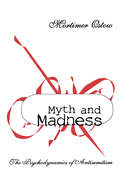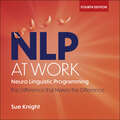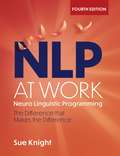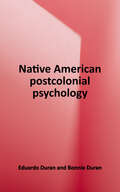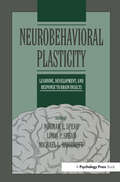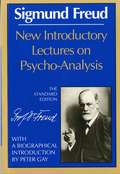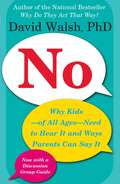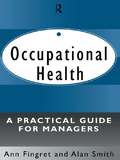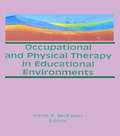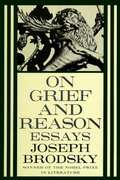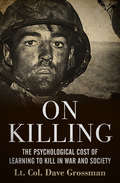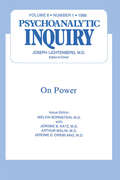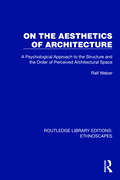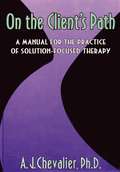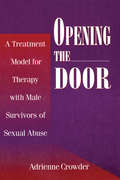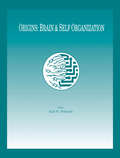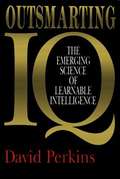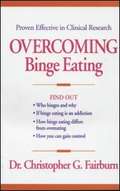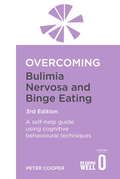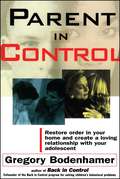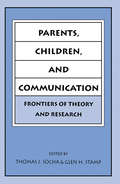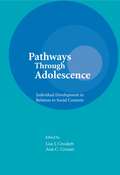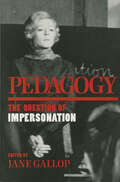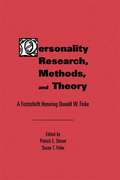- Table View
- List View
Myth and Madness: The Psychodynamics of Anti-Semitism
by Mortimer OstowThe persistence of anti-Semitism and its current resurgence after a brief post-Holocaust suppression, challenge those who study human behavior to locate the causal bases of anti-Semitism and find approaches to combat it. This is an astonishing report of a nine-year study of the psychodynamics of anti-Semitism. Undertaken by Dr. Mortimer Ostow on behalf of the Psychoanalytic Research and Development Fund, it puts flesh and bones on the discussion of antisemitism in Sigmund Freud's 1939 classic theoretical study Moses and Monotheism. Its close adherence to case material, and application of psychoanalytic theory to historical data and cultural products, yields new insights into bigotry and equity alike.By examining prejudiced patients and their myths, Dr. Ostow shows the common threads of anti-Semitism in a variety of national and cultural settings, even under supposed optimal conditions when antisemitism is stringently controlled. The work uses the psychiatric approach, and can be read as a study of how this area of behavioral science reveals the interplay of the individual and the group, cultural background and material opportunities.The book is divided into five major segments: Psychoanalytic interpretation of anti-Semitism in the past; clinical data on anti-Semitic sentiments in a variety of personal and national settings; mythological dimensions of anti-Semitism and apocalyptic doctrines; specific anti-Semitic myths including pre-Christian early and medieval Christian, "racial" and post-modern Muslim anti-Semitism. The final segment focuses on the pogrom mentality, including the Nazi phenomenon, antisemitic fundamentalism, and black anti-Semitism.Myth and Madness is informed by an amazing breadth of learning: from biblical exegesis to modern sociology, from close attention to mundane patients to evaluating mythic claims of the loftiest, and at times most dangerous sort. This is a landmark effort—one that will be the touchstone for theoretical and clinical works to come.
NLP at Work: 4th Edition: The Difference that Makes the Difference
by Sue Knight'This book may help you to understand life more clearly' Paul Smith, fashion designerWelcome to THE book on NLP. The essence of NLP is the ability to study and reproduce excellence in yourself and to support others to do the same. NLP AT WORK helps you do that by developing an attitude of curiosity, naivety and learning - and giving you the ability to improvise with skill in real-time. Neuro Linguistic Programming is how you make sense of your world and, most importantly, how you make it what you want it to be: * Neuro: the way you filter and process your experience through your senses. * Linguistic: the way you interpret your experience through language. * Programming: the way you make sense of your experience to create your personal programme. NLP AT WORK is one of the most popular books ever published on the practical skills of NLP and how it can be applied in business. It transformed NLP from a peripheral art into an accessible, practical concept with relevant applications in the areas of influence, communication, negotiation, teamwork and coaching. Clear, readable and jargon free, this book will help you get to the essence of what makes you and your business excellent and unique.(P) 2020 Hodder & Stoughton Ltd
NLP at Work: The Difference that Makes the Difference
by Sue Knight'This book may help you to understand life more clearly' Paul Smith, fashion designerWelcome to THE book on NLP. The essence of NLP is the ability to study and reproduce excellence in yourself and to support others to do the same. NLP AT WORK helps you do that by developing an attitude of curiosity, naivety and learning - and giving you the ability to improvise with skill in real-time. Neuro Linguistic Programming is how you make sense of your world and, most importantly, how you make it what you want it to be: * Neuro: the way you filter and process your experience through your senses. * Linguistic: the way you interpret your experience through language. * Programming: the way you make sense of your experience to create your personal programme. NLP AT WORK is one of the most popular books ever published on the practical skills of NLP and how it can be applied in business. It transformed NLP from a peripheral art into an accessible, practical concept with relevant applications in the areas of influence, communication, negotiation, teamwork and coaching. This major new edition has been revised throughout and expanded to include a new section on coaching with NLP, showing how this approach is so different to traditional methods, and a new chapter on Metamessages. Clear, readable and jargon free, this book will help you get to the essence of what makes you and your business excellent and unique.
Native American Postcolonial Psychology (SUNY Series In Transpersonal And Humanistic Psychology)
by Eduardo Duran Bonnie DuranThis book shows that it is necessary to understand intergenerational trauma and internalized oppression in order to understand Native Americans today. It makes native American ways of conceptualizing the world available to readers.
Native American Postcolonial Psychology (Suny Series In Transpersonal And Humanistic Psychology Ser.)
by Eduardo Duran Bonnie DuranThis book shows that it is necessary to understand intergenerational trauma and internalized oppression in order to understand Native Americans today. It makes native American ways of conceptualizing the world available to readers.
Neurobehavioral Plasticity: Learning, Development, and Response to Brain Insults
by Robert L. IsaacsonThis book describes a unique combination of research programs based on a striking variety of hypotheses and procedures directed toward understanding the sources and consequences of neurobehavioral plasticity. This remarkable attribute of the nervous system -- to be pliable and capable of being shaped or formed by natural or artificial sources toward adaptation or maladaptation -- is considered in terms of the neurochemical forces and neuroanatomical structure that has been found to be pivotal for this function. The impetus for this volume was a symposium held to honor Robert L. Isaacson for his scientific and pedagogical achievements as well as his contributions to behavioral neuroscience. Corresponding to his three major research interests, the book is divided into three sections as follows: * the first explores the relationship between the limbic system and behavior, with an emphasis on learning and memory; * the second considers -- through a wide range of approaches -- issues of plasticity in behavior and brain; and * the third deals with neural and chemical determinants of normal and abnormal behavior. This volume is not only a fitting tribute to Isaacson, but also an unusual collection of new evidence, procedures, and theories destined to have significant influence on behavioral neuroscience.
New Introductory Lectures on Psycho-Analysis
by Sigmund Freud James StracheyFreud's New Introductory Lectures on Psycho-Analysis takes full account of his elaborations in, and changes of mind about, psychoanalytic theory, and discusses a variety of controversial themes, including anxiety, the drives, and female sexuality.
No: Why Kids--of All Ages--Need to Hear It and Ways Parents Can Say It (Cornell Studies In Industrial And Labor Relations Ser. #No. 30)
by Dr. David WalshNo. It's not just a one-word answer, it's a parenting strategy. By saying No when you need to, you help your children develop skills such as self-reliance, self-discipline, respect, integrity, the ability to delay gratification, and a host of other crucial character traits they need to be successful. Although the importance of using No should be obvious, many parents have a hard time saying it -- even when they know they should -- when other parents and the culture around them are being permissive. Now, successful psychologist, bestselling author, and nationally known parenting expert Dr. David Walsh provides you with an arsenal of tactics, explanations, and examples for using No the right way with your kids. With Dr. Walsh's straightforward "parent tool kits," you can assess and improve your relationship with your kids, set and enforce limits that make sense for different ages (from toddlers to teens), and otherwise make No a positive influence on kids' behavior and in your overall family life. Other parenting books broach the topics of tough love and discipline, but only No offers the lively voice, warm wisdom, science made simple, and breadth of knowledge that readers have come to expect from Dr. Walsh. The first look at the psychological importance of No in a child's development, No is filled with down-to-earth advice that you can put into practice immediately. Dr. Walsh's memorable, affecting, and sometimes humorous anecdotes remind you that you're not alone in your parenting struggles and help you regain confidence in your own judgment and ability to say No. His stories also reinforce his message that establishing healthy limits is not only essential for kids' well-being, it's vital for creating disciplined, productive adults who can compete in a global marketplace and ensure a prosperous economic future for our country. Most important, No gives parents real, effective strategies for helping their children bloom and grow, giving them the psychological resources to become healthy, happy adults.
Occupational Health: A Practical Guide for Managers
by Alan Smith Dr. Ann FingretNew legislation and recommended working practices demand that every organisation considers carefully the health of its workforce. Occupational Health: A Practical Guide for Managers offers a comprehensive view of health and safety issues at work. The range of people it aims to appeal to reflects the interdisciplinary nature of this subject. Personnel professionals, managers and occupational health practitioners alike will find it an invaluable resource.
Occupational and Physical Therapy in Educational Environments
by Irene McewenOccupational and Physical Therapy in Educational Environments covers the major issues involved in providing lawful, team-oriented, and effective occupational and physical therapy services for students with disabilities in public schools. For those involved with students with disabilities, this book helps them make sound decisions about services that will make a meaningful difference in the lives of these children.Since the 1975 enactment of Public Law 94--142, which mandated that occupational and physical therapy be provided “as may be required by a handicapped child to benefit from special education,” this required link between therapy and education has continued to lead to confusion and controversy about which students should receive therapy in school and what types of services should be provided. The purpose of Occupational and Physical Therapy in Educational Environments is to clarify the major issues surrounding occupational and physical therapy in public schools, and to provide a framework for delivery of team- and family-oriented services that meet individual needs of students with disabilities.For those unsure of current regulations regarding handicapped students, or those who need clarification on the law, the book begins with a review of legislation and regulations. This begins to guide and shape schools’provision of therapy services. The following chapters assist occupational and physical therapists and important members of the educational teams of disabled students to make sound decisions about which students need school-based therapy services: Laws that Shape Therapy Services in Educational Environments: summarizes the major statutory law, federal regulations, and case law interpretation in which school-based practice is grounded. Pediatric Therapy in the 1990s: reviews contemporary theories of motor development, motor control, and motor learning that have had major impact on therapy for school-age children with disabilities. Related Services Decision-Making: describes a strong team approach to determining a student’s need for occupational and physical therapy services, which takes into account the unique characteristics of both the student and the educational team. Assessment and Intervention in School-Based Practice: describes an approach to assessment and intervention in schools that clearly illustrates a relationship between therapy and educational programs that result in meaningful outcomes for students. Challenges of Interagency Collaboration: reports on a qualitative study that points out that schools are not the only settings in which many students with disabilities receive services, so coordination between various agencies is essential to avoid gaps, overlaps, and cross purposes.Those who can benefit from Occupational and Physical Therapy in Educational Environments include occupational and physical therapists who work in public schools, school administrators, teachers, and even parents of disabled children.
On Grief and Reason: Essays
by Joseph Brodsky21 essays: Spoils of War, The Condition We Call Exile, A Place as Good as Any, Uncommon Visage, Acceptance Speech, After a Journey, Altra Ego, How to Read a Book, In Praise of Boredom, Profile of Clio, Speech at the Stadium, Collector's Item, An Immodest Proposal, Letter to a President, On Grief and Reason, Homage to Marcus Aurelius, A Cat's Meow, Wooing the Inanimate, Ninety Years Later, Letter to Horace, and In Memory of Stephen Spender.
On Killing: The Psychological Cost of Learning to Kill in War and Society
by Lt. Col. Dave GrossmanA controversial psychological examination of how soldiers&’ willingness to kill has been encouraged and exploited to the detriment of contemporary civilian society. Psychologist and US Army Ranger Dave Grossman writes that the vast majority of soldiers are loath to pull the trigger in battle. Unfortunately, modern armies, using Pavlovian and operant conditioning, have developed sophisticated ways of overcoming this instinctive aversion. The mental cost for members of the military, as witnessed by the increase in post-traumatic stress, is devastating. The sociological cost for the rest of us is even worse: Contemporary civilian society, particularly the media, replicates the army&’s conditioning techniques and, Grossman argues, is responsible for the rising rate of murder and violence, especially among the young. Drawing from interviews, personal accounts, and academic studies, On Killing is an important look at the techniques the military uses to overcome the powerful reluctance to kill, of how killing affects the soldier, and of the societal implications of escalating violence.
On Power: Psychoanalytic Inquiry, 6.1
by Melvin BornsteinFirst published in 1995. Routledge is an imprint of Taylor & Francis, an informa company.
On the Aesthetics of Architecture: A Psychological Approach to the Structure and the Order of Perceived Architectural Space (Routledge Library Editions: Ethnoscapes)
by Ralf WeberOriginally published in 1995 as part of the Ethnoscapes: Current Challenges in the Environmental Social Sciences series, reissued now with a new series introduction, On the Aesthetics of Architecture is a result of an interdisciplinary study in architectural theory, psychology and philosophy and the author’s experience as a practicing architect. It tries to relate theories of aesthetics and recent advances in the psychology of visual perception to the practice of design.The text starts with an analysis of traditional and contemporary schools of thought in architectural theory, and then proceeds through the formulation of a general theory of aesthetics based on perceptual and cognitive information processing to a description of the actual conditions under which aesthetic experiences of buildings and cities take place. It exemplifies principles of aesthetic appropriateness through an analysis of architectural space and form.Weber’s book attempts to move the discussion of architectural aesthetics beyond the shifting doctrines of style and the often ambiguous dicta of critics. While the author makes no claim that his interpretation of psychological research will result in good architecture, he does insist on the need to bring the discussion of form back to more objective grounds. As such, it provided a valuable teaching resource and an important new contribution to the discussion among architects themselves, as well as between psychologists, philosophers and art theorists at the time.
On the Client's Path: A Manual for the Practice of Brief Solution-focused Therapy
by A. J. ChevalierAccording to the solution-focused model, the answer to a client's problem will ultimately come from the client's own repertoire of coping strategies. On the Client's Path provides everything you need in terms of theory and the step-by-step components of the solution-focused process. It shows how this therapy can be applied to a variety of clients in a range of clinical and medical settings. Additional chapters cover worst-case scenarios and crisis situations. Numerous case notes offer client-therapist dialogues drawn from a broad range of case histories.
Opening The Door: A Treatment Model For Therapy With Male Survivors Of Sexual Abuse
by Adrienne CrowderFirst published in 1995. Routledge is an imprint of Taylor & Francis, an informa company.
Origins: Brain and Self Organization (INNS Series of Texts, Monographs, and Proceedings Series)
by Karl PribramThe result of the second Appalachian conference on neurodynamics, this volume focuses on the problem of "order," its origins, evolution, and future. Central to this concern lies our understanding of time. Both classical and quantum physics have developed their conceptions within a framework of time symmetry. Divided into four major sections, this book: * provides refreshingly new approaches to the problem of the evolution of order, indicating the directions that need to be taken in subsequent conferences which will address learning and memory more directly; * addresses the issue of how information becomes transmitted in the nervous system; * shows how patterns are constructed at the synaptodendritic level of processing and how such pattern construction relates to image processing; and * deals with the control operations which operate on image processing to construct entities such as visual and auditory objects such as phonemes. The aim of the conference was to bring together professionals to exchange ideas -- some were fairly worked out; others were in their infancy. As a result, one of the most valuable aspects of the conference is that it fostered lasting interactive relationships among these leading researchers.
Outsmarting IQ: The Emerging Science of Learnable Intelligence
by David PerkinsSince the turn of the century, the idea that intellectual capacity is fixed has been generally accepted. But increasingly, psychologists, educators, and others have come to challenge this premise. Outsmarting IQ reveals how earlier discoveries about IQ, together with recent research, show that intelligence is not genetically fixed. Intelligence can be taught. David Perkins, renowned for his research on thinking, learning, and education, identifies three distinct kinds of intelligence: the fixed neurological intelligence linked to IQ tests; the specialized knowledge and experience that individuals acquire over time; and reflective intelligence, the ability to become aware of one's mental habits and transcend limited patterns of thinking. Although all of these forms of intelligence function simultaneously, it is reflective intelligence, Perkins shows, that affords the best opportunity to amplify human intellect. This is the kind of intelligence that helps us to make wise personal decisions, solve challenging technical problems, find creative ideas, and learn complex topics in mathematics, the sciences, management, and other areas. It is the kind of intelligence most needed in an increasingly competitive and complicated world. Using his own pathbreaking research at Harvard and a rich array of other sources, Perkins paints a compelling picture of the skills and attitudes underlying learnable intelligence. He identifies typical pitfalls in multiple perspectives, and neglecting evidence. He reveals the underlying mechanisms of intelligent behavior. And he explores new frontiers in the development of intelligence in education, business, and other settings. This book will be of interest to people who have a personal or professional stake in increasing their intellectual skills, to those who look toward better education and a more thoughtful society, and not least to those who follow today's heated debates about the nature of intelligence.
Overcoming Binge Eating
by Christopher G. FairburnThis is a book for women of any age who are struggling with binge eating. The author provides a clear discussion of how and why we binge and a self-help program to stop binging. Going beyond diets and quick fixes, this book helps people stop the cycle of binges, guilt, purging, and dieting.
Overcoming Bulimia Nervosa and Binge Eating 3rd Edition: A self-help guide using cognitive behavioural techniques (Overcoming Ser.)
by Peter CooperAs many as one in 20 women in the western world suffer bouts of uncontrolled binge-eating. Going without food for long periods, making yourself vomit and taking laxatives you don't need are also common and are symptoms of bulimia nervosa. Such illness costs lives if not successfully treated.Now in its second edition, Peter Cooper's sympathetic and highly acclaimed guide gives a clear explanation of the disorder and the serious health issues that can result from it. He describes the treatments available today and, most importantly, sets out a self-help guide for those who want to tackle their difficulties for themselves, with a step-by-step programme. This is a real chance for sufferers to take the road to recovery, and will give their friends and family a much clearer understanding of the illness and its remedy.
Parent In Control
by Gregory BodenhamerParent in Control is based on a highly successful program that has helped thousands of parents regain control over their out-of-control adolescents - whether they wreak havoc at home, in school, or in the community. Living with willful, aggressive, and seemingly incorrigible adolescent behavior is a nightmare many heartbroken and confused parents were forced to endure - until now. In this straightforward, hard-hitting, yet compassionate book, Gregory Bodenhamer, a nationally renowned expert on childhood behavior problems, shows parents how to combat an arsenal that ranges from blatant verbal challenges to physical violence, without resorting to harsh disciplinary measures, expensive counseling, or hospital-based programs. Bodenhamer, a former juvenile probation officer, draws on over twenty years of experience working with difficult children between the ages of 12 and 17 and their parents to offer techniques that work in as little as a few weeks. He covers a wide range of problems - whether your teen is simply ignoring household rules, or perhaps lying, or stealing - to more harmful problems, such as drug and alcohol abuse or unsafe sexual activities. Using real-life scenarios, complete with actual dialogue, Bodenhamer walks you through potentially explosive situations, points out errors most parents frequently make, and provides tested solutions to averting immediate danger - and preventing it from happening again.
Parents, Children, and Communication: Frontiers of Theory and Research (Routledge Communication Series)
by Thomas J. Socha Glen H. StampThis is the first edited volume in the communication field to examine parent-child interaction. It creates a framework for future research in this growing area -- family communication, and more specifically, parent-child communication -- and also suggests new areas of communication research among parents and children -- cultural, work-related, taboo topics, family sex discussions, conflict, and abuse. Chapter authors provide thorough coverage of theoretical approaches, new methods, and emerging contexts including lesbian/gay parent-child relationships. In so doing, they bring a communication perspective to enduring problems of discipline, adolescent conflict, and physical child abuse. The text highlights various methodological approaches -- both quantitative and qualitative -- including conversation analysis, grounded theory, participant-observation, and phenomenological interviewing of children. It also introduces and surveys various theoretical approaches -- general systems, developmental, cultural, and intergenerational transmission.
Pathways Through Adolescence: individual Development in Relation To Social Contexts (Penn State Series on Child and Adolescent Development)
by Lisa J. Crockett Ann C. CrouterAdolescent researchers are increasingly aware that they must examine development both across time and across context. To do so, however, requires new conceptualizations and methodological approaches to the study of development, including attention to the pathways young people choose in adolescence and follow into adulthood. This volume assembles work by key researchers in the field who are struggling to understand how developmental trajectories are constructed and maintained throughout the adolescent period. A complete understanding of developmental pathways requires the recognition that adolescents' social contexts--family, school, neighborhood, and/or peer group--are important influences on the choices they make at this developmental period. Researchers have traditionally studied contexts in isolation rather than examining the interrelationships among contexts and their implications for adolescent development. The present volume seeks to address this gap in the literature, with attention given not only to the interrelationships among contexts for white, middle-class youth, but also to these issues for minority adolescents in neighborhoods that vary in terms of access to resources. It concludes with an examination of researcher-community collaboration as a strategy to move communities toward a greater awareness of adolescent development and the problems facing youth in their community, and as a means to promote potential avenues for policy change and intervention.
Pedagogy: The Question of Impersonation
by Jane GallopIn this anthology, teachers and scholars examine the ways in which teaching is a performance that incorporates acts of impersonation.Drawn from a conference on classroom dynamics, this anthology explores both the personal and performative aspects of teacher-student relationships. After David Crane’s prefatory “postscript,” George Otte recommends that students pretend, writing from various perspectives; Indira Karamcheti suggests putting on race as one can put on gender roles. Cheryl Johnson gets personal by playing the “trickster,” and Chris Amirault explores the relationship between the teacher and “the good student.”While Karamcheti, Gallop, and Lynne Joyrich use theatrical vehicles to structure their essays, Joseph Litvak, Arthur W. Frank, and Naomi Scheman incorporate performance as examples. Madeleine R. Grumet theorizes pedagogy, while Roger I. Simon suggests that pedagogical roles can be taken on and off at will; Gregory Jay discusses the ethical side of impersonation; and Susan Miller denounces “the personal” as a sham.
Personality Research, Methods, and Theory: A Festschrift Honoring Donald W. Fiske
by Susan T. Fiske Patrick E. ShroutDonald W. Fiske's professional life and collaborations are themselves a textbook in the development of the field of personality. From the field's early origins in personnel selection, rating accuracy, and psychotherapy outcomes, to its current status of theoretical and methodological maturity -- complete with mid-life crises -- the field has been fundamentally changed by Fiske's work, and the changes have influenced generations of scholars. This festschrift is a celebration of Fiske's impact, but not merely of his impact on the history of personality research. Instead, the volume focuses on ongoing debates and issues that have been framed or influenced by Fiske's work. The festschrift's three sections are organized around three themes in Fiske's writings -- themes that also correspond to three periods in his career. This volume examines current thinking about what can be known about personality, how constructs relevant to personality psychology are best measured, and how to approach specific research problems in personality and related fields. The contributors create an eminent cross-section of the development and current status of personality methods. In addition to Fiske's eminent contemporaries, the contributors to this volume include Fiske's former students, collaborators, and his two children, both of whom are behavioral scientists. The accomplishments of his students, colleagues, and children testifies to the range of psychologists who have benefited from his scholarly and practical wisdom. This collection is a valuable textbook for an advanced graduate course as well as appealing as a scholarly resource. Many of the contributors are renown psychological leaders who have made available their latest original thoughts. The book concludes with an essay by Fiske offering his perspective on the central themes: behavioral and social science metatheory, methods, and strategies.
